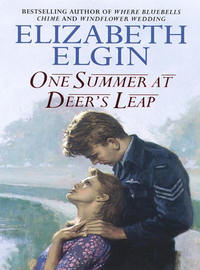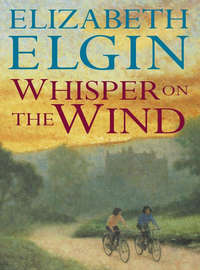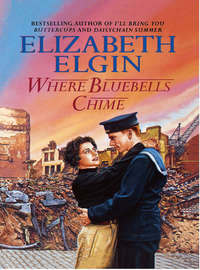
Полная версия
The Willow Pool
‘No. More mad at myself at realizing I’m goin’ to miss you! But Doll would want you to give it a try, and if heaven gets to be too much for you, girl, there’s always Tippet’s Yard to come home to! Reckon I’d do the same if I was your age!’
The post office in Scotland Road was open again for business, its windows boarded up, the inside gloomy. There was a queue in front of Meg and a longer one behind her.
‘Gotyeridentitycard?’ The lady behind the counter was too busy to go into minute details over a few pounds. Meg handed over the withdrawal form and her mother’s identity card.
‘Four pounds, ten shillings you want?’
‘Yes, please. Leave the eight and six in, will you?’
Meg signed D. Blundell with the exaggerated looped D and a rounded B. It might, she thought, have been her mother’s own signature, so well had she done it.
‘Next, please!
The clerk pushed the book, in which she had folded three pound notes, three ten-shilling notes and the identity card, under the grille.
Meg walked out into the road, relief shuddering through her. Though why she should feel like this she didn’t know, because it was her money, left to her in Ma’s will, and if she had signed – or was it forged? – Ma’s name, she hadn’t done anything illegal; not really illegal!
The branch office of the Ministry of Food, next door but one, which had been damaged by the same bomb that had closed the post office, was now open too.
‘Gotyeridentitycard?’
If there was a phrase that would go down in history when this war was over, Meg decided, it was the time-after-time requests for identity cards!
Meg offered her ration book and watched as two weeks’ food was obliterated by a purple stamp and two one-week emergency cards filled in with her name and identity number.
Now there was only a letter to write to Kip, the floors at number 1 to be swept and mopped, and the last of the bomb dust shifted from the furniture. Then she would pack enough for two weeks, collect Ma’s case from Nell, and all would be ready for an early start in the morning.
She wouldn’t sleep tonight, but who cared?
Four
Meg was surprised and pleased to find Polly Kenworthy waiting at the bus stop.
‘How did you know when I’d be getting here?’ she beamed.
‘I didn’t. I was posting a parcel to Davie and Mrs Potter asked me if the young lady had managed to find Candlefold – about the job, she meant – and I told her you had. And that you’d be coming today. The bus was about due, so I hung around just in case.’
‘Did you think I wouldn’t come?’
‘I hoped you would. My bike is outside the post office. We can put your case on the seat – save you carrying it.’
‘That’s very kind of you,’ Meg said slowly, remembering how her mother had spoken, feeling that now was her chance to knock the edges off her Liverpool accent; talk proper, like Ma had done.
‘So how often do you write to your young man,’ Meg asked as they walked.
‘Every day. Sometimes more than that – even if it’s only I love you and miss you – oh, you know what it’s like when you’d give anything to be with them for just a couple of minutes.’
‘No. I don’t. There’s someone I write to; he’s in the Merchant Navy. He’d like us to go steady – even said he’d buy me a ring in Sydney, but I hope he won’t. I – I’m not ready to be in love with anybody yet.’
‘Not ready, Meg? But falling in love just happens, whether you’re ready for it or not! You see a man and that’s it! The minute I laid eyes on Davie everything went boing! inside me. He’s in Mark’s regiment – Mark is my brother, did I tell you? – and he got a crafty thirty-six-hour pass and brought Davie along. They were walking across the courtyard, Mark said something, and Davie threw back his head and laughed. That was the exact moment I fell in love with him. I didn’t know who he was and it never occurred to me to wonder if he had a girl or might even be married. He was the man I wanted; simple as that! And don’t tell me I’m too young to know my own mind, that I haven’t been around enough. I met Davie, so I don’t want to gad around now. I just want us to be married.’
‘And will you be, or must you wait till you’re twenty-one?’
‘Mummy would like me to wait. She agreed to our being engaged but she wants us to give it time, so we’re both sure. Mind, if Davie gets posted overseas she might let us get married on his embarkation leave, which wouldn’t be very satisfactory, really.’
‘See what you mean. It would be lovely bein’ married, but it might only be for a week.’
‘Yes. I’d be a lonely young wife for the rest of the war, probably. I wish I were twenty-one.’
‘How old are you, Polly?’
‘Twenty, almost.’
‘Ar. You’ll have to register when you’re twenty, for war work.’
‘Don’t I know it! If Davie and me were married, They couldn’t send me into the armed forces – only make me find a job. I’d like to stay at Candlefold. When I’m not helping in the house, I work in the kitchen garden, digging for victory, sort of. We grow a lot of vegetables and saladings and soft fruits – apples and pears too. Once, when fuel wasn’t rationed, we could heat the greenhouses and get early crops, but not any more.
‘When the Government took the brick house, they left us the kitchen garden, and the Home Farm, which Mrs Potter’s brother-in-law rents from us. I suppose it was a good thing really that They wanted the brick part of the house. It saves us heating it, because one bag of coal a week doesn’t go far, does it? Thank goodness we have the woods. We go scavenging if there’s been a gale, and bring in branches that have come down and saw them into logs. Every little helps.’
‘So what do we do here?’ They had come to the stile. ‘Shall I give you a lift over with the bike?’
‘No. We’ll carry on to the crossroads. A lane leads to the house from there. It’s a bit further to walk but it’s better than pushing the bike through the grass.’
‘Tell me, please.’ Meg decided it was time to sort out the way things were to be. ‘I’ve never worked as a servant before. In the shop, we had to call ladies madam and men sir. Is that what I call your mother? And do I call you Miss Polly?’
‘Good heavens, no! You’re not a servant, Meg. You’re a home help and we’re glad to have you! I’m Polly; Mummy is Mrs John, Gran is Mrs Kenworthy, so there’s no mixing them up. My real name is Mary, like Mummy’s, so I get called Polly, which I like. With two Marys and two Mrs Kenworthys, you’ll see what I mean. Oh, and there’s Nanny Boag!’
‘Boag!’ Meg gasped, remembering the lady on the photograph.
‘Mm. An unusual name, isn’t it? Scottish, I believe. She came to Gran when my pa was born, then stayed on, and when Mark and me arrived she was our nanny too. She’s part of the family really, when she remembers who she is. Mostly, these days, she’s in love with the Prince of Wales!’
‘But we haven’t got a Prince of Wales! He shoved off with Mrs Simpson.’
‘Nanny chooses to ignore that, poor thing. She was such a love. Now, she’s in a world of her own most times!’
‘And you go along with it?’
‘We-e-ll, she’s no trouble, really. You’ll soon get used to her ways.’
‘And Mrs Kenworthy?’
‘Darling Gran. She doesn’t have much of a time of it. You’ll be kind to her, won’t you, Meg? Often, especially when the weather is cold, she’s in pain; sometimes her hands are so bad she can’t hold a cup. She doesn’t complain, though, and she’ll be so pleased if you pop in from time to time, ask her if she’s comfy – maybe have a little chat. She hasn’t been downstairs for ages, poor love.’
‘Then wouldn’t it be better if she was?’ Meg reasoned. ‘When Ma got real bad, I made her a bed on the living-room sofa.’
‘We’ve thought about that, but someone would have to sleep downstairs, then, and there isn’t room. It’s one of the reasons we need you, Meg. Mummy gets tired sometimes.’
‘Then it’s a good job you’ll be getting an extra pair of feet,’ Meg smiled as they came into the courtyard from the far end. ‘And doesn’t the house look lovely, all covered in flowers?’ Her mother might once have stood at this very spot and felt as she did, Meg marvelled.
Ma? She sent out her thoughts as they passed the pump trough. Do you know I’m here?
There was no reply; she hadn’t really expected one. But a red rose that trailed over the doorway blew in the breeze as if it were nodding to her, telling her what she needed to know.
‘Here we are, then!’ Polly pushed open the door. ‘Welcome to Candlefold, Meg Blundell, and I do hope you’ll stay.’
‘I hope so too.’ Meg returned the smile, and contentment washed over her.
Oh, but she would! She had come home to Candlefold and to Ma, and no doubt about it, she was stoppin’!
‘So you’ve come, Meg!’ Mary Kenworthy – Mrs John – stood at the door, drying her hands. ‘I’m so glad. Be a dear, Polly; pop and tell Nanny I’ll be up in five minutes! She’s been ringing her bell for ages and I was determined not to answer it until I’d peeled the potatoes!’
‘OK,’ Polly sighed, disappearing.
‘Well, now that I’m here, peelin’ potatoes will be my job, and once I’ve met Nanny, I’ll run up and down when she rings. But should you be waitin’ on her, Mrs John? Why can’t she come down once in a while? Is she bad on her feet, or somethin’?’
‘No. It’s just her mind that’s sick – muddled. Nanny lives in the past, you see, and the nursery is her domain still. She sleeps in the night nursery and the day nursery is her sitting room. She insists the stairs are too much for her, but it could be because she doesn’t want to leave her rooms. Yet there must still be some semblance of reason in her head, because I think she’s unwilling to come downstairs in case the present catches up with her! She knows that Mark has joined the Army. She just wants to pretend she has children in the nursery still, and the war hasn’t happened. My husband was severely wounded in the last one – his abdomen and chest. He died when Polly was four. Nanny never forgave the Kaiser!’
‘So when this war started she decided to ignore it?’
‘She was already getting a little vague; when she found we were at war again it seemed to be the last straw. And when Mark left, that was it! She just lapsed into her long-ago world. She’s eighty, you know. Best we go along with her little moods, I suppose. She was so good to me when John died. I don’t know how I’d have pulled myself together if it hadn’t been for Nanny.’
‘But she rings her bell to call you like a servant, Mrs John – surely, that can’t be right?’
‘No, but understandable. She’s back in the days when we had a staff to run the house – we never called them servants, Meg – and she still thinks she’s only got to ring.’
‘Well, she won’t be ringing till she finds her bell,’ Polly grinned from the kitchen doorway. ‘I’ve hidden it behind the curtain. I’ll take you to meet her after lunch, Meg. You’ll learn to humour her. She’s no trouble really. If she gets a bit bossy you just walk away!’
‘But why do you have to put up with such a carry-on? I mean, she isn’t family.’
‘No, but she’s Nanny,’ Mary Kenworthy smiled gently, ‘which is pretty much the same thing. And she stayed with us through good times and bad. Almost family, Meg.’
‘Ar. I see,’ Meg nodded, though she didn’t see at all! That Nanny seemed a right old faggot! In the photograph she’d had a mouth on her like a steel trap! Nanny Boag and Master Mark her mother had written on the back of the picture of Polly’s brother in his christening gown.
But no one here knew about the photographs of Candlefold and no one would get to know until she was good and ready to tell them. Good-hearted though they were, and decent to a servant who’d got into trouble, Meg wanted to find out for herself how it had really been, and not be told kindly and gently about it by an embarrassed Mrs John. Because that was how it would be if ever she admitted being Dorothy Blundell’s daughter, and herself born at Candlefold!
‘By the way,’ Polly giggled, ‘Nanny is busy at the moment sticking pins into a newspaper picture of Mrs Simpson. I’ll leave her to it and take you up there, Meg, when she’s back to more normal, sort of. Seeing a strange face in her present mood might be a bit too much for her!’
‘Oooh! She isn’t a witch, is she? Sticking pins, I mean!’ Meg gasped.
‘Don’t worry, my dear. Nanny, even at her most troublesome, is no worse than a child having a fit of the sulks. I’m sure she doesn’t know the first thing about witchcraft, even though it’s supposed to be witch country around these parts! Now, shall Polly take you to your room, then show you round the house and what is left to us of the gardens and outbuildings? And the kitchen garden, of course. And when you do, Polly, can you ask Mr Potter if we can have a couple of spring cabbages?’
‘Potter? That’s the name of the lady at the post office, isn’t it?’
‘That’s right. Our gardener is her husband. We are such a tiny community that everyone seems connected in some way or another. It’s Mrs Potter’s sister and her husband – Armitage – who rent Home Farm from us. Everybody knows everybody. And by the time you’ve had two weeks with us, Meg, you’ll know if you want to be a part of it or not. There are no picture houses or dance halls in Nether Barton. Only hops, sometimes, in the parish hall. Will you miss things like that?’
She said it anxiously, Meg thought, as if to think that her home help might leave at the end of the fortnight troubled her.
‘I might, Mrs John, but I don’t think I will. After that bombing it’s safer here! And anyway, Ma and me always wanted to live in the country, so I hope I suit.’
‘I think you will. And by the way,’ Polly smiled at her mother, ‘is it omelettes for lunch? I can get some saladings from Potter if it is.’
‘Omelettes!’ Meg gasped. ‘You need eggs for them, don’t you?’
‘Yes, but we have our own hens, you see, and we’re very lucky to have our own cow too. A little Jersey. We keep her at Home Farm with the herd there, and Armitage milks her for us. So you can have plenty of milk on your porridge at breakfast, and an egg as well.
‘At night we have a big mug of Ovaltine – if we’ve been able to get any in the shops, that is – or milky cocoa. We sit round the table here, and call it our quiet time; think of the day ahead. We Kenworthys are optimists. Tomorrow is a day to look forward to, not the day that never comes! Are you an optimist, Meg Blundell?’
‘Yes, I am,’ she said firmly, because who in her right mind wouldn’t be an optimist in a house like this, with all the milk she could drink, and a fresh egg for breakfast?
The afternoon sun warmed the stones of the old house to honey, and bees buzzed around roses and clematis that climbed the walls and peeped into upstairs windows.
‘I like this bit of Candlefold best.’ Polly waved an embracing hand. ‘Oh, the newer, red-brick part of the house is very elegant, but this old greystone bit is solid and safe, somehow. The walls are two feet thick, which makes it cooler in summer and warmer in winter. The very first Kenworthy built this in 1320; look over the door, you can still make out the date. It was chiselled there when a yeoman farmer brought his bride here and fathered eight children on her, though only two lived.
‘Children died in medieval times. I suppose my early ancestors thought themselves lucky to rear two sons to manhood. The elder took the farm, as it was then; the younger went to London to seek his fortune, so maybe there is another line of Kenworthys running parallel to ours. Fortunately, the one who lived here was taught to read and write by the monks at the abbey, so he could count his money, and read his Bible – in Latin, of course!’
‘And I bet he gave plenty to the Church, an’ all!’ Meg remembered from history lessons at school how large the Church had loomed in long-ago England.
‘Yes. Mummy says they gave their tithe, always – a tenth of all the crops they grew and a fair bit of the cash in hand, so to speak. I don’t know when our lot stopped being Catholics. A lot of the families around this part of Lancashire never gave up the old religion – held secret Masses. But it seems the sixteenth-century Kenworthys thought it politic to be Anglo-Catholic. It’s common knowledge they sat on the fence during the Civil War too, paying lip service to Cromwell, yet all the time helping royalists or hiding them if they were on the run from Roundhead soldiers! I suppose we got very good at surviving; that’s why we’re still here!’
There had been a Kenworthy at Waterloo and one fought in the Crimea. ‘Our lot have lived here for six hundred years, Meg. No one else but a direct-line Kenworthy. God, wouldn’t it be awful if something happened and the line ended? Hell! I hate wars!’
Tears filled her eyes and Meg was in no doubt she was thinking of Davie, and thought herself lucky she wasn’t in love – not properly in love – with Kip Lewis. Loving someone so desperately took over your whole life; she knew that already from the way Polly went from smiles to tears in seconds. Mind, Polly Kenworthy was lucky knowing who she was, Meg had to admit; knew all about her ancestors way back to 1320, whilst Margaret Mary Blundell didn’t even know her grandparents, nor even who had fathered her. Polly was twice lucky because she had background and a pedigree.
It was all because of Candlefold, which wasn’t just a very old house, but a way of life. Candlefold had become Ma’s happy place because before she had come here to work, the life she’d led hadn’t been worth mentioning. Where Ma was born and reared Meg would never know now; sufficient only to accept that Ma’s life began here, as a fourteen-year-old girl sent into domestic service.
Small wonder Dolly Blundell had loved the place, and the kindness and happiness and the belonging; no prizes for guessing where Ma had blossomed into a pretty girl who laughed a lot, for hadn’t she always been laughing or smiling on those photographs?
Who were you, Ma? Who am I? And why does this house have a hold over you and me? Why did you tell me with your thoughts that I must come here?
‘Hey! A penny for them! I asked if you’d like to see the other part of the house, but you were miles away.’
‘I was thinkin’ that you know so much about your family and I know nuthink at all about mine.’
‘But you must know something – your mother and father and your grandparents – unless you were a foundling.’
‘What’s a foundling?’ Meg scowled, sorry she had said what she had.
‘An orphan of the storm, an abandoned child …’
‘Well, I wasn’t! You know I had a mother! But I never knew my father. He was a seaman and died at sea of plague, or something. Anyway, they sewed his body in sailcloth and weighted it and buried him at sea. That’s all I know. Never knew my grandparents’
She told stinking lies too. Her father dying at sea, indeed! Mind, if he had, that was the way he’d have gone, because Kip once told her that was how it was. One of Kip’s crew had died of yellow fever and they’d got him overboard pretty quick, he’d said, so it wouldn’t spread.
‘I never knew my grandpa; can hardly remember my father either. Sometimes bits come back, but they are very hazy. But I’ve got a gran, and you can share her with me, Meg. So are we going to have a look at the brick house, then?’
‘Won’t we get into trouble? Won’t there be guards?’
‘Not a bod in sight. Oh, someone comes about once a month to check the place over, and sometimes a van arrives and things are taken in. Mummy says she thinks that either documents or records or works of art are stored there. Well, they couldn’t leave all the stuff in London for the Luftwaffe to bomb, could they? Museums and art galleries were emptied as soon as war started, don’t forget. Maybe some of it is here, snug and safe – who knows?’
‘But don’t you care, Polly, about them nicking your house?’
‘No! Why should I? All I care about is that this war is over as soon as maybe, and that Davie and Mark will come through it safely – and all the servicemen and women. Wars are wrong and stupid. Look what happened to my father. His war wounds slowly killed him!’ Tears came once more, and Meg knew she was thinking about Davie again.
‘Ar hey, girl! Nuthink’s going to happen to your feller! How could it, when he’s never out of your thoughts? And your brother’s goin’ to be all right too, so how about you and me doin’ a tour of the place? Then you can take me to meet your gran, eh?’
‘Yes, of course!’ Polly pulled her hand across her eyes. ‘And Nanny too.’
‘Y-yes …’ Daft old Nanny, who lived in a pretend world and stuck pins in pictures and had tantrums you walked away from. No harm in her at all! Childlike, Mrs John said. So why, all at once, did Meg not want to visit the nursery? Why did just thinking about it make her uneasy, even though she would be meeting an old lady who had brought up two generations of Kenworthys and who Polly obviously loved; Mrs John too! Why should she feel peculiar about meeting someone she had only before seen on a photograph as a nanny in long skirts, a baby boy in her arms?
She did not know what gave her the creepy feeling. Sufficient to say she would know soon enough if her fears held substance. This very afternoon, in fact, when they climbed the stairs to the nursery.
The wide, cushioned windowsill in her bedroom made a comfortable seat and Meg sat, arms around knees, looking out over fields and trees to the distant evening sky. It was past ten and the light was beginning to fade, blurring the outlines of trees and hedges, rounding them with mist. Twilight here was gentler than at Tippet’s Yard, where the fading of the light made outlines of buildings sharp and dark against the skyline. Here at Candlefold a bird sang to warn against the ending of the day, and all about was soft and hushed.
The white-painted walls of the room reflected the light from the window and softened into palest apricot; over the weathercock atop the stables, the first star appeared, low in the sky. Did you wish on first stars? Starlight star bright, first star I’ve seen tonight … Did you close your eyes and cross your fingers and wish to stay here for ever and sleep always in this blue-flowered room?
Meg closed her eyes to call back the day that had been: she and Polly pushing through a gap in the hedge and into the garden of the house the faceless ones had taken, to gaze at its shuttered windows, neglected lawns, the broad sweep of weed-choked steps. She had seen it all before in a photograph. … 1916. Garden Party … wounded soldiers. The tussocked grass was fine-trimmed then, and roses that ran wild over the front of the house were once trained into obedience. Afterwards, they had climbed the stairs to the nursery.
‘Can I come in? Polly pushed open the door. ‘I’ve brought someone to see you.’
Nanny Boag in a rocking chair, knitted slippers on her feet. She wore a printed cotton dress, and an embroidered pinafore tied at the waist. She looked younger than the long-skirted, black-bonneted lady in the photograph. Her cheeks were plump, her eyes wide as she turned eagerly.
‘Polly, dear! How nice of you to bring your little friend! What is your name, child?’
‘Meg.’
‘Meg who? Cat got your tongue? Did your nanny bring you? Where is she?’
‘In the kitchen, talking to Cook,’ Polly hastened, pink-cheeked.
‘Doesn’t Nanny get a kiss then, or have we forgotten our manners?’ The elderly woman offered her cheek; dutifully Polly kissed it.
‘Were you having a little sleep? Did we wake you? Shall we come back later?’
‘Sleep? Goodness me, no! Nanny hasn’t time to sleep! I was just thinking about Scotland and all the packing to be done! August already, and the year flown by! Go and play with your friend, dear, and don’t get into mischief! And put your bonnet on, or you’ll get freckles! Close the door quietly!’
Her eyelids drooped, her chin fell on her chest.







